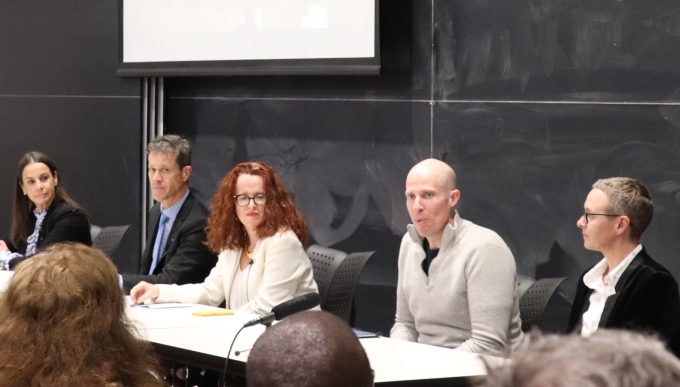2020 marked 30 years of the Bachelor of Engineering program at The Australian National University (ANU). To celebrate this milestone during ANU Alumni Week, we welcomed an esteemed panel of experts as we reflect on the past 30 years and look ahead to what the discipline will look like in the next 30 years.
We asked the question: what are the engineering and computing skills we need to engage with the conversation around technology in 2050? Who will be exercising them, and how?
“Tonight we’re celebrating 30 years of engineering at the ANU by looking forward to the next 30 years,” said Professor Chris Kellett, Director of the School of Engineering, in his welcome address for the evening.
“Engineering at ANU, and our College, is really an exciting and vibrant place to be at the moment. And I firmly believe that we’re well placed to place our distinctive mark on what enginering will look like in 2050. All of you have been part of that journey for the past 30 years. And I would hope and invite you to continue the journey with us in the next 30 years.”
In imagining what engineering should look like in 2050, Distinguished Professor Genevieve Bell, Director of the School of Cybernetics, recommends looking beyond just the skills that are necessary.
“It’s more important to think about the values and mindset we need to embody in 2050, rather than the skills we will need - radical, political, engaged, a responsibility to build something that doesn’t exist and bring that into the world.”
Jane Mcmaster, Chief Engineer of Engineers Australia, spoke on the key challenges and aspirations in the professional discipline.
“Some people say the pace of change is never going to be as slow as it is today. I think complexity too is arugably increasing,” she said. “So the challenge for engineering in the future is that we’re probably going to have to specalise a bit more. Our challenges will become more complex, and we’re going to have to collaborate more.”
Panellist Adrian Piani, ACT Chief Engineer, was part of the 1990 Bachelor of Engineering cohort and holds fond memories of his time at ANU. With a background in environmental engineering, he spoke on the need to re-engineer our environment and to use increasing data strengths to take on the digital challenge of the future.
“Unfortunately our environment is still degrading, and in 2050 will probably be worse than it is now,” he said. “I think at some stage we’ll have to take a more proactive approach to our environment…a more active view of what the environment needs to look like to support life and reengineering it.”
Mikaela Jade, proud Cabrogal woman, Founder and CEO of Indigital and 3a Institute student, predicted that we may be looking more towards the natural world in the future - as one of the most efficient energy systems, recyclers, and engineers.
“Working with the world’s oldest knowledge systems and the world’s new newest knowledge systems - and co-designing solutions together will be really important.”
Watch the full panel discussion
What will engineering look like in 2050? | Tuesday 16 March 2021
Featuring:
- Distinguished Professor Genevieve Bell, Head, 3A Institute and Director, ANU School of Cybernetics
- Jane Macmaster, Chief Engineer – Engineers Australia
- Adrian Piani, ACT Chief Engineer
- Mikaela Jade, Founder and CEO, Indigital
Facilitated by Professor Lachlan Blackhall, Head of the ANU Battery Storage and Grid Integration Program, and featuring addresses from Professor Elanor Huntington, Dean, ANU College of Engineering and Computer Science, and Professor Chris Kellett, Director, ANU School of Engineering.

